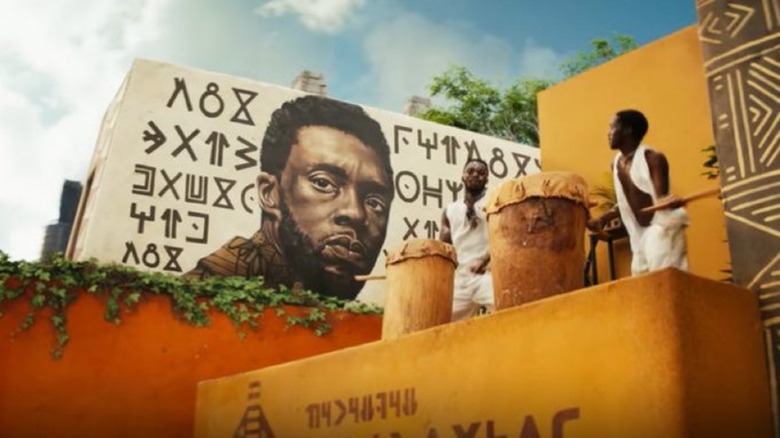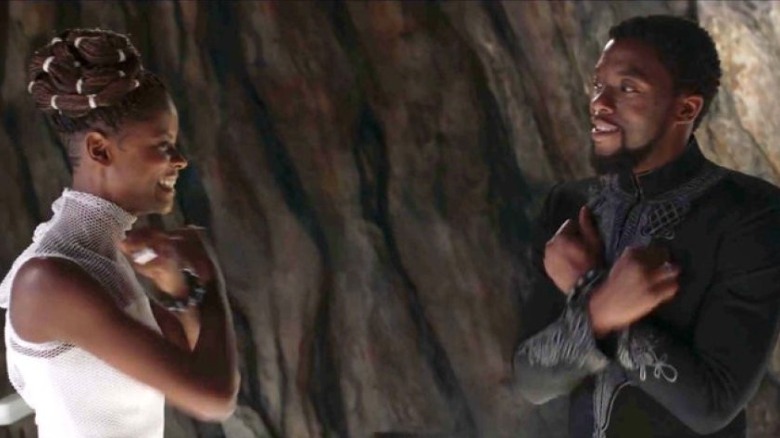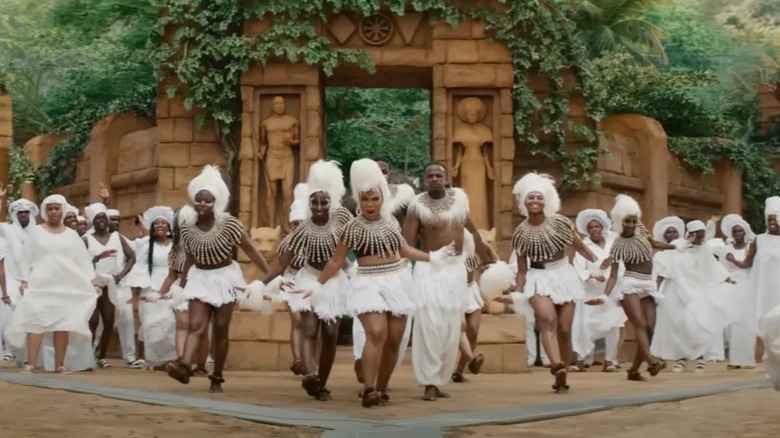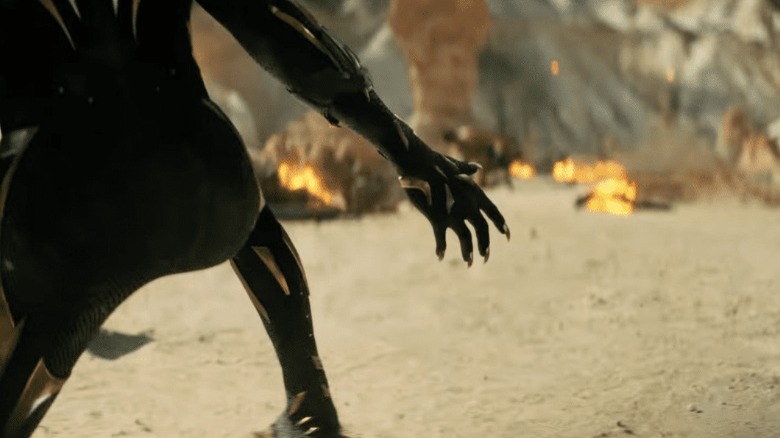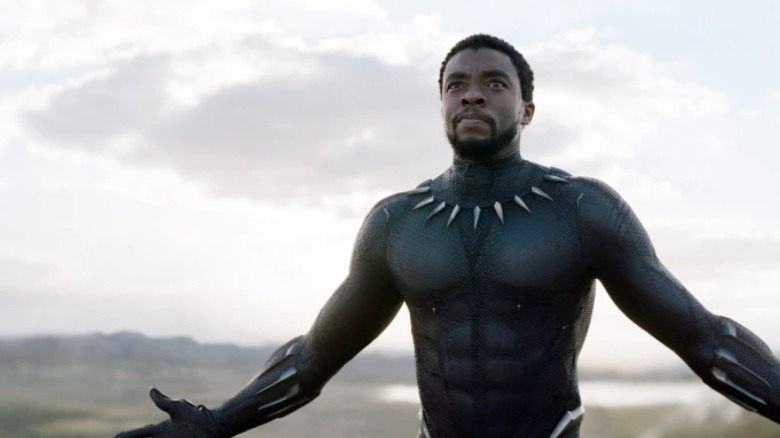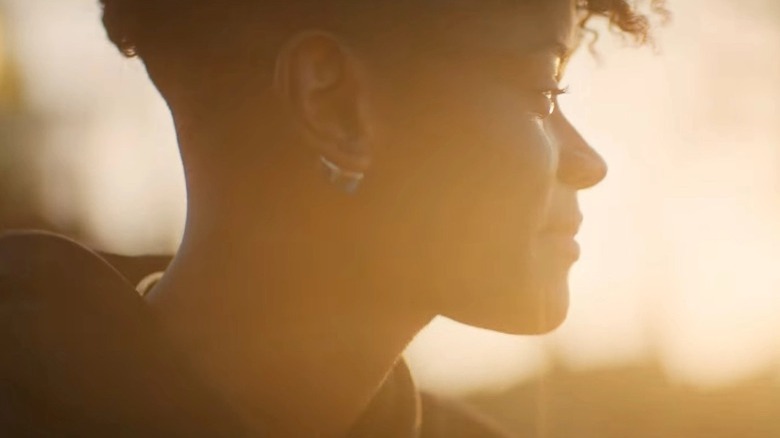How Marvel And Black Panther: Wakanda Forever Pays Multiple Tributes To Chadwick Boseman And T'Challa
Warning: This article includes spoilers from "Black Panther: Wakanda Forever."
Going into "Black Panther: Wakanda Forever," I was a little bit worried about what my crying situation would be like. Personally, I've always loved finding emotional catharsis at the movies, but if the trailers for this film were any indication, I was worried I'd be sobbing through my mask for the full 2-hour-and-41-minute runtime.
For better or worse, though, it turns out "Black Panther: Wakanda Forever" chooses some pretty specific, fairly self-contained moments to pay tribute to the late, great actor Chadwick Boseman and his character King T'Challa. Though the character's absence permeates the film, it's still a Marvel movie — one that needs to hit on plenty of narrative beats and tell a story that, while informed by T'Challa's legacy, isn't entirely about it. There are fish people and child prodigies and CIA frenemies to worry about too, after all.
But Ryan Coogler, the film's cast and crew, and Marvel fans clearly have a whole lot of love and pain to process, and the movie builds in several lovingly constructed outlets to let those feelings show. I'm grateful it does because it's impossible not to mourn along with the characters when these moments of tribute do arrive.
The opening Marvel fanfare
Coogler makes a lot of beautiful filmmaking decisions in "Black Panther: Wakanda Forever," but the most breathtaking one may be his use of silence. In a moment that's antithetical to the constantly swelling orchestral scores of Marvel movies past, the film's opening fanfare is delivered with no music or sound at all.
It's also a touching in memoriam for Boseman: While the Marvel logo would normally be built out of famous scenes from MCU movies past, giving the feeling of Avengers assembling in real time, this version is entirely made of scenes of Boseman as King T'Challa. It's nearly impossible not to shed a tear when you see it, and the fact that Coogler lets audiences sit quietly together with that emotion without being regaled by immediate noise and music feels like a blessing.
The funeral scene
The movie makes another smart emotional decision by letting audiences feel the loss — of T'Challa, but moreso, the gifted actor who played him — right away. After a heartbreaking scene in which Shuri (Letitia Wright) tries to save her brother by 3D printing a solution to his rapidly deteriorating health, we're dropped straight into the king's funeral sequence. Much of this scene is on display in the movie's trailers, but seeing it in context is just as emotional.
Every detail of this scene feels like a tribute, from the Black Panther's coffin, to the gathering of mourners and dancers in traditional Wakandan garb, to the mural of Boseman's face watching over the crowd from a nearby building. The entire sequence is held together by Angela Bassett's Queen Ramonda, who is at once effortlessly regal and obviously shattered.
Waiting to take up the mantle
As previews have already revealed, one of the women of "Black Panther: Wakanda Forever" does ultimately take up the mantle of the fallen hero, but the film intentionally waits to answer the question of who wears the suit until its climax. This doesn't feel like a cheap building of suspense, though, so much as a much-needed mourning period. Just as many fans all over the world called for T'Challa's character to be retired rather than recast when news of Boseman's passing hit in 2020, Shuri is adamant that Wakanda doesn't need anyone else wearing the suit in the aftermath of T'Challa's passing.
Of course, the suit eventually does come out of retirement, but it's after a period of more than a year of mourning and is a redesign. The original suit, I would guess, is retired for good, like a professional athlete's jersey number. There's another practical reason the Black Panther tradition was interrupted between films, as Killmonger (Michael B. Jordan) burned the heart-shaped herb used in the ritual that makes the new Black Panther official back in the first film. It's only appropriate, then, that T'Challa's scientist sister quite literally rebuilds her heart after he's gone.
The final scene
The film's final scene may be the one that hits hardest. "Black Panther: Wakanda Forever" takes plenty of detours across its ample runtime, but it finds its way back to the emotional core of its story at the end. After the Wakandans' battle with the underwater army from Talokan, Shuri returns to Haiti with Nakia (Lupita Nyong'o). The film closes on perhaps the most self-reflective emotional end note Marvel has ever pulled off, as Shuri finally burns her mourning clothes — a ritual she had planned to do with her mother — on the beach. As she does, we once again see flashes of Boseman as T'Challa, a character's life flashing before our eyes.
This is another purposeful moment of silence, and while there's a chance fans might try to clap over the Marvel fanfare in theaters, this one seems even more designed to let us quietly sit with our grief and emotion. The tribute is to T'Challa, but the feelings the scene evokes are for Boseman, gone far too soon. As the credits begin to roll, Rihanna's ballad "Lift Me Up" begins to play, and it's a song that Coogler has said the artist 'did for Chad.' The credits begin to play over the close-up image of the garments burning, a strangely beautiful sight that embodies life, death, and rebirth at once.
The mid-credits scene
Of course, since this is a Marvel movie, it's bound to have a credits scene, and "Black Panther: Wakanda Forever" has what may be the most important and emotional one in MCU history. In a reveal that falls perfectly into place with everything we know about Nakia's timeline in the story, we find out that she had a child with T'Challa. The reveal, like everything else in the movie, doesn't play out as a surprise plot point so much as a surprise emotional beat. We're caught off guard not by the reality of sweet young Toussaint — Nakia was gone for years, after all, and working with kids the whole time — but by the reality of how overcome with emotions he makes us feel.
It's hard to pinpoint exactly what it is about T'Challa's son that makes me want to break down weeping, but I think it's that his reveal is an inverse of the terrible news of Boseman's passing. Finding out that someone you looked up to was secretly sick for years is endlessly painful; finding out that their character who you looked up to had a happy family in secret is the exact opposite feeling. Coogler has written a poignant legacy fit for a king, and it's a legacy that's made complete by one, too: the boy whose Wakandan name is, of course, Prince T'Challa.
